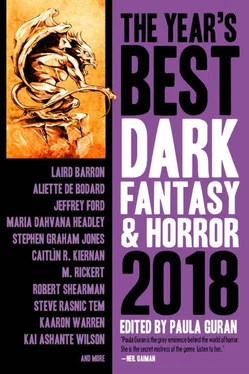“Theresa,” you call again, as you limp through the living room. Veer off to look in the bedroom, check behind the closed bathroom door. But what you see in the bathroom makes you pause. Things are missing. Her toothbrush, the pack of birth control, contact lens solution.
“Theresa!?” and this time you are close to panic as you hobble down the hall to the kitchen.
The smell hits you first. The scent of fresh coffee, bright and familiar.
When you see the person sitting calmly at the kitchen table, their back to you, you relax. But that’s not Theresa.
He turns slightly, enough so you can catch his profile, and says, “Come on in, Jesse.”
“What the fuck are you doing here?”
White Wolf winces, as if your words hurt him. “You better have a seat.”
“What did you do to my wife?!”
“I didn’t do anything to your wife.” He picks up a small folded piece of paper, holds it out. You snatch it from his fingers and move so you can see his face. The note in your hand feels like wildfire, something with the potential to sear you to the bone. You want to rip it wide open, you want to flee before its revelations scar you. You ache to read it now, now, but you won’t give him the satisfaction of your desperation.
“So now you remember me,” you huff.
“I apologize for that. But you were making a scene and I couldn’t have you upsetting DarAnne.”
You want to ask how he knows DarAnne, how he was there with her in the first place. But you already know. Boss said the new guy’s name was Wolf.
“You’re a real son of a bitch, you know that?”
White Wolf looks away from you, that same pained look on his face. Like you’re embarrassing yourself again. “Why don’t you help yourself to some coffee,” he says, gesturing to the coffee pot. Your coffee pot.
“I don’t need your permission to get coffee in my own house,” you shout.
“Okay,” he says, leaning back. You can’t help but notice how handsome he looks, his dark hair a little longer, the choker on his neck setting off the arch of his high cheekbones.
You take your time getting coffee—sugar, creamer which you would never usually take—before you drop into the seat across from him. Only then do you open the note, hands trembling, dread twisting hard in your gut.
“She’s gone to her mother’s,” White Wolf explains as you read the same words on the page. “For her own safety. She wants you out by the time she gets back.”
“What did you tell her?”
“Only the truth. That you got yourself fired, that you were on a bender, drunk in some alleyway downtown like a bad stereotype.” He leans in. “You’ve been gone for two days.”
You blink. It’s true, but it’s not true, too.
“Theresa wouldn’t…” But she would, wouldn’t she? She’d said it a million times, given you a million chances.
“She needs a real man, Jesse. Someone who can take care of her.”
“And that’s you?” You muster all the scorn you can when you say that, but it comes out more a question than a judgment. You remember how you gave him the benefit of the doubt on that whole Cherokee thing, how you thought “pretendian” was cruel.
He clears his throat. Stands.
“It’s time for you to go,” he says. “I promised Theresa you’d be gone, and I’ve got to get to work soon.” Something about him seems to expand, to take up the space you once occupied. Until you feel small, superfluous.
“Did you ever think,” he says, his voice thoughtful, his head tilted to study you like a strange foreign body, “that maybe this is my experience, and you’re the tourist here?”
“This is my house,” you protest, but you’re not sure you believe it now. Your head hurts. The coffee in your hand is already cold. How long have you been sitting here? Your thoughts blur to histories, your words become nothing more than forgotten facts and half-truths. Your heart, a dusty repository for lost loves and desires, never realized.
“Not anymore,” he says.
Nausea rolls over you. That same stretching sensation you get when you Relocate out of an Experience.
Whiplash, and then…
You let go.
Moon, and Memory, and Muchness
Katherine Vaz
I begin at three o’clock in the morning. There’s a glaze over tonight’s rind of the moon. Sometimes—this being a club-dense part of the East Village—I jump out of my skin at the sound of breaking glass, a quarrel; I almost cry out for Alicia. I assemble the adorable, tiny pots of lemon curd and mango jam and the comfits that my customers steal. I use a butter-cutter pastry tool on the best butter for the pumpkin scones. A New York Times food editor asked for my secret ingredient in the crystallized-ginger muffins, but I demurred, not because it is exotic but because it’s frightfully simple: I add coconut extract. My walk-in freezer is packed to its gills, but everything is precisely labeled. Grief can do this: There’s a ferocious desire to control and align the world, as if that stops or reverses the time. Mini-quiches, miniature tortilla molds for lentil salad. I fix roulade sandwiches with Russian dressing, turkey, and Cotswold cheddar. Does a person ever conquer an eating disorder? Everything screams, Eat Me, Drink Me. As a young wife and mother, I blew up two sizes, melted down three, over and over. Now I survive on practically nothing, toast and rose-hip infusions. My Wonderland Tea Shop and its kitchen are downstairs, and I perch in small quarters above. After one day’s prep, service, and clean-up, it’s always time to start over again.
What is the “bargaining” stage of grief? Since I’ve never figured that out, I fear I’m trapped in whatever “it” is. If I hold my temper when a customer spills clotted cream on the floor, will Alicia reappear? If I smile as a woman changes her order from white tea to rooibos to the Zen Mix, will my child’s ghost appear? If I throw out the news clippings about the two young madmen who tormented and murdered Alicia, will I get un-stuck in Time? (Is that even something I want?) My ex-husband, Bill, lives with a new wife and son (already a schoolboy!) in Phoenix, and we chat on occasion; we have lunch (I watch him eat while I can’t finish my soup) when he returns for the parole hearings. I’m glad for him. He blamed me for Alicia, but I blame myself. At an arts-and-crafts emporium in Chelsea, while gathering holly and garlands for Christmas, I turned my back, and the earth swallowed her.
Above the shop, my rented rooms are so minute it’s as if I live in the cutaway of a whelk shell. Painted on the face of the ticking tabletop clock is a girl on a swing, her Mary Janes frozen toward heaven. There’s never wine on hand, because I’d drink it and then there’d be no wine anyway. Occasionally I resort to pills for sleep and glide in technicolor dreams, flowers talking, flamingoes playing a game with me as the baseball. I maintain, intact, the pint-sized tea table that Alicia loved arranging for Mr. Bun, her stuffed rabbit, and Mabel the mouse, and Jackie the toucan. At each setting are plastic wands filled with water, glitter, and tiny keys. Bill joined the little parties we threw for her animals, mint in sugar-water and vanilla wafers; he was a warm father and husband.
I used to teach poetry at a small college on Staten Island, but those eager faces, even the ones ravaged by wild partying, blazed their hopeful innocence in my direction, nearly burning me alive. Bill was an accountant. We lived modestly, us three, in Murray Hill. We sold our apartment and shared the profits after the two boys—rich, with a lawyer passionately loud about the burden of their privileges—were sentenced to only twelve years. Alicia died at age six. Eight years ago. It was yesterday.
Читать дальше












